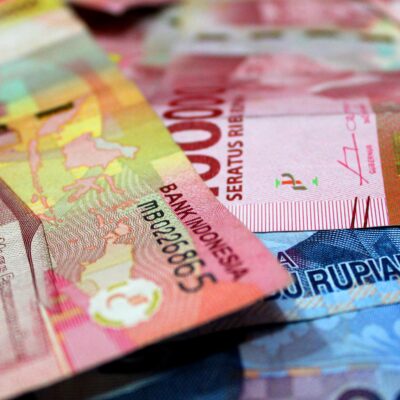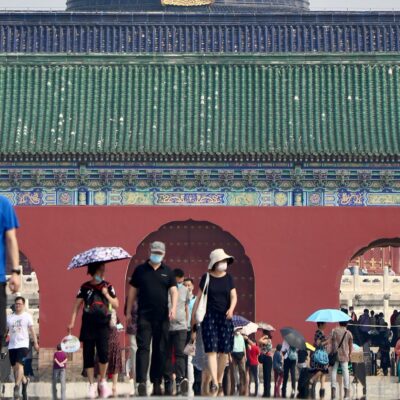Thanks to its government’s renewed interest in foreign affairs and calculated management of great powers relations, Indonesia will likely emerge well-off in the post-pandemic regional order. While domestic political priorities drove Indonesia’s foreign policy inward during President Joko Widodo’s first term of presidency, greater domestic support in his second and final term has allowed a relatively more active and assertive foreign policy. Informed by the ‘independent and active’ principle, Indonesia’s responses to great powers rivalry and COVID-19 challenges could end up seeing the country capable of shaping geopolitical dynamics rather than just responding to the actions of the bigger players.
Geopolitical destiny
Indonesia has always been an important player. An economy with ‘enormous promise,’ Indonesia may become the world’s seventh-largest economy by 2030 and, according to the President, could be the fourth largest when it celebrates its centennial of independence in 2045. This year, its economic growth is expected to rebound to pre-pandemic levels following the gradual relaxation of public health-related restrictions in 2022. Indonesia also assumes the presidency of the G20 during a critical time that will see the world’s major developed countries and emerging economies charting their post-pandemic visions.
Indonesia is the informal leader of the Association of Southeast Asian Nations (ASEAN). For better or worse, its regional leadership is based less on military and economic power than on trust and confidence. This is evident in Indonesia’s role as mediator and ‘honest broker’ in regional conflicts, including the Cambodian conflict in the 1980s and the ongoing South China Sea disputes. Furthermore, while democracy is under scrutiny in some developed countries, Indonesia can continue its status as not only the world’s third-largest democracy but also a nation where democracy and Islam exist fairly harmoniously.
Above anything else, however, Indonesia’s location means it is strategically important in the context of great powers politics. Located between the Indian Ocean and the Pacific, Indonesia is the host or co-host of a number of important chokepoints and sea lanes vital for the global economy. It shares with Singapore and Malaysia control of the Strait of Malacca, the shortest route from the Middle East to East Asia through which 80 percent of China’s oil imports enter the South China Sea. Japan, South Korea, and India also rely substantially on this route. Indonesia’s own designated sea lanes through the Strait of Sunda and Lombok are more costly but nevertheless viable alternatives to the Strait of Malacca.
These sea lanes are also crucial for the movement of military forces of user states. The extremely deep channels of the Ombai and Wetar Straits near Timor Leste, for example, provide an access route for submarines between the Pacific and the Indian Ocean, making them critical waterways for American defence interests. Furthermore, any conventional threat to Australia would likely come from or through Indonesian waters and airspace. In short, control of Indonesia’s sea lanes is invaluable during peacetime and conflict.
Great powers, politics and the pandemic
Given this geopolitical reality, it is not only pointless but also impractical for Indonesia, as Asia’s greatest geopolitical prize, to align itself exclusively with either the United States or China. For its part, the history of colonial subjugation and foreign interference, from the United States-backed rebellions in the 1950s, China’s alleged support for the failed coup in 1965 to Australia’s involvement in the independence of Timor Leste—all of which leaves a deep imprint in Indonesia’s strategic culture and threat perception. Until recently, the prospect of foreign entities using domestic collaborators to wage so-called ‘proxy wars’ was still been voiced as a concern by Indonesia’s military leadership.
However, history suggests that Indonesia is also concerned whenever Western powers signal their withdrawal from the region and leave the vacuum filled by either the Soviet Union or China. As noted by scholar John Ciorciari, in 1971, ASEAN, of which Indonesia was a founding member, responded to the announcement of the British withdrawal from Singapore and the 1969 Nixon Doctrine (that the U.S. would not assume the primary responsibility for providing defence for a threatened ally) by declaring Southeast Asia as a Zone of Peace, Freedom and Neutrality. Following the withdrawal of the United States from Vietnam, ASEAN responded with the Treaty of Amity and Cooperation (TAC) in 1976, which set the normative framework of ASEAN’s subsequent engagement with the great powers.
The result of this historical experience is a foreign policy approach that plays no favourites as far as great power relations is concerned. Indonesia’s approach aims for simultaneous engagement with the competing great powers based on its own pragmatic interests while trying to maintain its autonomy. A prominent Indonesian strategic thinker, Evan Laksmana, calls this strategy ‘pragmatic equidistance.’ In its contemporary manifestation, the strategy entails adopting seemingly contradictory measures such as simultaneously forging defence partnerships with both the United States and China or standing firm against any Chinese incursion into its territory while securing more economic investment from Beijing. In the era where everyone is either looking, tilting, or pivoting to Asia, Indonesia’s art of diplomacy is pretty much about trying to keep everyone from waging war for as long as possible while promoting its own interests through a calculated multidirectional approach.
This approach is evident in Indonesia’s ‘vaccine diplomacy.’ Indonesia turned to China for COVID-19 vaccine supply when export restrictions were still keeping Western vaccines within their respective borders. Chinese vaccines were also appealing as they were priced competitively. By October 2021, after receiving steady supplies for almost 12 months, more than half of COVID-19 vaccine doses ready to be administered that had arrived in Indonesia were produced by either Sinovac or Sinopharm.
China would have probably wanted to supply all of Indonesia’s COVID-19 vaccines as it would have increased Indonesia’s dependence on China and, hence, its influence. However, informed by its foreign policy doctrine to avoid total reliance on any particular great power, Jokowi’s administration decided that it would be better to diversify Indonesia’s vaccine supply. By October 2021, Indonesia had received 33 million doses of Oxford-AstraZeneca vaccine (24 percent of total imported vaccines) and 22 million doses of Pfizer-BioNTech (15 percent) from various sources.
Vaccine diversification allows Indonesia to maintain autonomy in choosing a course of action as China’s activities in the South China Sea continue to be a concern for Indonesia. Over the last decade, China has intensified its gradual erosion of Indonesia’s control over the waters off the Natuna Islands. Insisting that it has overlapping claims on ‘maritime rights and interests’ with Indonesia, China’s fishing fleets and maritime security forces have been repeatedly involved in standoffs with Indonesian authorities in the area. However, the skirmishes that started in October 2019 and continued until January 2020 marked a bigger rift as they involved a significantly larger number of Chinese fishing vessels, escorted by coast guard vessels and a warship, which stayed in the disputed area for a prolonged period.
China’s insistence that it was entitled to draw straight baselines around the groups of islands in the South China Sea, much like the way Indonesia drew its boundaries, was particularly troubling for Indonesia. According to common interpretation to the 1982 Law of the Sea, the right to draw archipelagic baselines exists only for states like Indonesia, whose landmass consist entirely of islands.
In the Philippines, China’s vaccine diplomacy may have undermined Manila’s resolve to defend its interests in the South China Sea. Indonesia, meanwhile, has managed to continue to mobilise its resources to counter China’s incursions in Natuna. In addition to strengthening patrols in the disputed area, the Indonesian government turned to legal and diplomatic actions to push China back. In May 2020, Indonesia took part in the then ongoing ‘battle of diplomatic notes.’ Triggered by a submission on an extended continental shelf by Malaysia in December 2019, the diplomatic note exchange involved wide participation from impacted states, including extra-regional countries like the United States and Australia, who asserted their respective positions regarding the South China Sea disputes. Indonesia joined other Southeast Asian claimant states in invoking the 2016 South China Sea Arbitral Tribunal Award, which had ruled illegal China’s claims in the South China Sea.
Further, in the second half of 2021 the Chinese coast guard and navy vessels spent weeks moving back and forth near the site of an offshore oil and gas drilling off the Natuna Islands. The Chinese government reportedly made an unprecedented move by sending a letter demanding Indonesia stop the drilling. However, Indonesian authorities did not comply, and declared the completion of the drilling in November a ‘victory’ over China’s constant objections.
In addition to these unilateral actions, Indonesia has also benefitted from the United States’ greater commitment to win over partners and allies in its effort to contain China. In August 2021, Indonesian Army hosted the Garuda Shield 21, a two-week joint exercise with the United States Army, despite protests from China. That the joint exercise was held while Indonesian maritime security forces were busy fending off China’s incursions in Natuna gave it a greater symbolic value. The 2021 joint exercise was also the biggest since it began 15 years ago, involving more than 2,100 Indonesian soldiers and 1,500 U.S. troops.
Interestingly, only two months before the oil rig standoff, the Indonesian Navy also held a joint exercise with the People’ Liberation Army Navy in the Java Sea, further highlighting Indonesia’s pragmatic approach in its great powers relations. The joint exercise focused on search and rescue—an area that the Indonesian military sought to develop following the sinking of one of its submarines in April 2021. Deputy Defence Minister Muhammad Herindra described joint exercises between the Indonesian military and its foreign counterparts as ‘common’ and indicated that Indonesia has a ‘good neighbour policy.’
Indonesia is set to benefit from the ongoing competition between the great powers in relation to infrastructure financing. While China’s Belt and Road Initiative (BRI) has continued to make inroads in the region even during the pandemic, the United States and its allies have also upped their infrastructure plans. During his visit to Jakarta in December 2021, U.S. Secretary of State Antony Blinken spoke of the U.S.’ commitment to ‘a better kind of infrastructure’ in the Indo-Pacific with the U.S.’ so-called Build Back Better World which promises to mobilise hundreds of billions of dollars in financing over coming years.
The arrival of new participants opposing China’s assertive claims in the South China Sea was another feature of great powers competition during the pandemic. Last year, the British royal navy sent a carrier strike group, led by the new aircraft carrier HMS Queen Elizabeth, sailing through the South China Sea as part of Britain’s Indo-Pacific ‘tilt’. Other European countries are also turning their attention to the region. In February 2021, a French nuclear attack submarine sailed through the Strait of Malacca and visited Vietnam. Defence Minister Florence Parly said in 2019 that France would continue sending warships to the South China Sea at least twice a year. Meanwhile, the deployment of the German frigate Bayern to the South China Sea in December 2021 was the first such tasking for the German navy in nearly two decades.
Indonesia does not seem to be opposed to the increased military presence by Western nations in the region. The deployment of the British Carrier Strike Group to the Indo-Pacific was preceded by a visit by the foreign secretary Dominic Raab to Jakarta in April 2021 where he reiterated London’s commitment to seek deeper cooperation on maritime security with Indonesia. When the governments of the United States, United Kingdom and Australia announced the AUKUS agreement in September, which involves Australia acquiring a fleet of nuclear-powered submarines, Indonesia’s initial response was cautious. However, after it had had more time to learn about the agreement and the potential opportunity it offers to keep China in check, the Indonesian government stated it ‘understands’ and ‘respects’ Australia’s decision. After all, the collapse of the submarine deal between Australia and France following the announcement of AUKUS gave an opening for France to strengthen its ties with Indonesia. In February 2022, Indonesian government announced a deal to procure 42 Rafale fighter jets and two submarines from France.
Seeking a legacy
While geopolitics defines the broad pattern of Indonesian pragmatic foreign policy approach, domestic politics influences the specifics. In a country where ‘the chief diplomat is the president, not the foreign minister,’ leaders’ personal attitudes towards foreign affairs plays no small role in shaping the tone and timing of Indonesian foreign policy.
Despite winning his first presidential election in 2014 with a manifesto full of strategic visions, Jokowi’s first term (2014-2019) did not live up to expectations as far as foreign policy was concerned. Jokowi’s disinterestedness in foreign affairs was matched only by his enthusiasm for infrastructure development and domestic economic policy. Unlike his predecessor President Susilo Bambang Yudhoyono, Jokowi dislikes ‘the formalities of diplomacy and public speaking.’ Moreover, coming to the Indonesian national oligarchic politics without elites or military background, Jokowi had to spend the first years of his presidency securing his position through coalition building and power sharing.
In contrast, Jokowi’s second and final five-year term as President is poised to become politically steadier. He managed to secure more votes in the October 2019 election than in 2014 and, given the two-term constitutional limit, public approval ratings are not as important as they would be if he were seeking re-election. By appointing his arch-rival Prabowo Subianto into the cabinet, Jokowi has also neutralised the opposition and further strengthened his power base. As noted by a former Singaporean ambassador to Indonesia, while Jokowi’s first term focused on domestic issues, he is trying to leave a foreign policy legacy in his second term. Jokowi might never be a foreign policy president the way his predecessor was, but after five years of experience meeting and talking with world leaders, one would assume he is better equipped in this context than he was when began his presidency.
In Indonesia, a strong domestic political base can often lead to governments embarking on a more assertive foreign policy approach. In the late 1980s and early 1990s, Suharto’s administration started to become more active after years of maintaining a ‘low profile’ to the outside world. From informal meetings to solve problems in Cambodia, the restoration of diplomatic relations with China, to the chairmanship of the Non-Aligned Movement (NAM), Indonesia sought to play a bigger role in regional and world affairs. Scholar Leo Suryadinata suggests that the shift can be attributed to the renewed confidence on the part of President Suharto following the landslide victory in 1982 general elections. With problems related to East Timor also then perceived to be under control, Suharto felt that he had the momentum to be more outward looking in terms of foreign relations (however this momentum of course was obliterated after the Santa Cruz massacre in East Timor and the subsequent multidimensional crisis that brought down Suharto’s New Order regime).
The same thing can be said about Yudhoyono’s administration. Coming to the presidency after Indonesia’s first direct presidential elections, President Yudhoyono leveraged Indonesia’s domestic democratic consolidation to revitalise its external standing. Thus, the promotion of democratic governance was one of the major themes of Indonesia’s foreign policy under Yudhoyono.
Under Jokowi’s second term, Indonesia is still punching below its weight and the overarching theme of its diplomacy continues to be ‘down-to-earth diplomacy’ (diplomasi membumi). But the dynamics of Jokowi’s second term are shifting away from his previously modest foreign policy. In some areas where it used to be muted, Indonesia has started to be more vocal. Indonesia’s actions in the South China Sea have done little to alter China’s revisionist behaviour, partly due to the sheer size of China’s military capabilities and its deliberate choice to remain below the threshold of open conflict. Nevertheless, Indonesia’s recent actions in Natuna prove that it is not shy of challenging China.
Indonesia has also recently been trying to regain its normative leadership in ASEAN by actively defending or promoting norms and principles that underpin ASEAN’s centrality. On Indonesia’s recommendation, an emergency meeting was convened in Jakarta in April 2021 to respond the military coup in Myanmar. Since then, Indonesia has maintained its firm stance on imposing costs on the military regime while promoting humanitarian assistance. Indonesia chaired ASEAN’s health sector cooperation and led the regional response to the COVID-19 pandemic. It also reconvened the ASEAN Human Rights Dialogue in 2021 and continues to promote ASEAN’s own outlook on Indo-Pacific. Not too bad a record, considering that it was widely assumed that Indonesia would abandon ASEAN when Jokowi first entered office in 2014. In fact, expectations are high for Indonesia to come up with new initiatives that can retain ASEAN’s relevance amidst great powers rivalry when it assumes the chairmanship of the regional organisation next year.
In January this year, Indonesia and Singapore concluded a number of agreements including the realignment of the Flight Information Region (FIR) on air navigation services, negotiation of which had dragged on for decades. In 2015, Jokowi had promised to take over the airspace that had been managed by Singapore since 1947. While the management of airspace is more related to aviation safety, the FIR takeover has been framed as a matter of sovereignty and nationalism within Indonesia’s domestic scene. In addition, Indonesia and Singapore also agreed on a revised extradition treaty and defence cooperation agreement. If ratified by the parliament, these agreements will be among Jokowi’s most important foreign policy achievements.
What lies ahead
It is clear that the rivalry between the U.S. and China is becoming more intense. Middle powers such as Australia, India and Japan are also becoming more active. Meanwhile, external powers such as Germany, France, and the UK are paying more attention to the Indo-Pacific region. Located right in the middle of this geopolitical convolution, Indonesia must always respond one way or another. However, domestic politics define the specifics of Indonesia’s foreign policy, such as timing, substance, and approach.
The aspiration in Jakarta currently seems to be that of playing a long game: keeping the competing great powers from outright conflict while reaping as many benefits as possible from their competition in order to build Indonesia’s capacity. With the greater domestic political space he currently enjoys and aspirations to leave a legacy, the rest of Jokowi’s second and final term of presidency might see Indonesia taking a more assertive approach towards this goal.
Image: Indonesia’s President Joko Widodo, Merdeka Palace, Jakarta, 2019. Credit: DFAT/Flickr. (This image has been cropped.)




